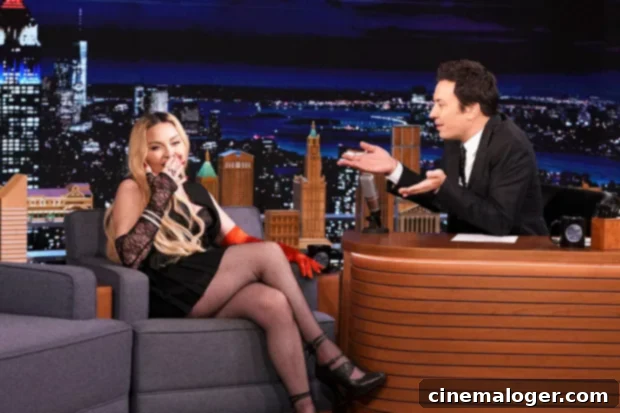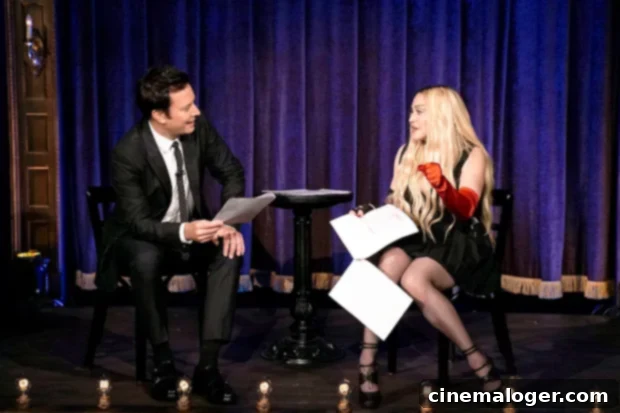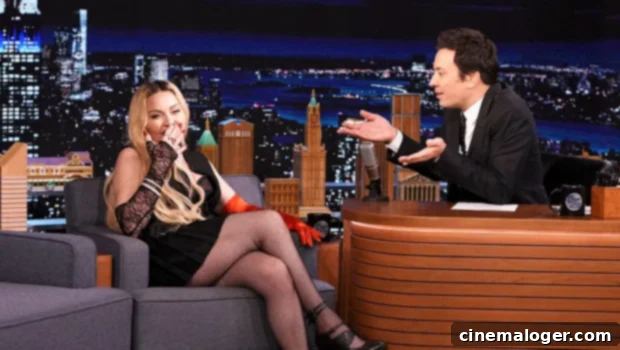Madonna’s Daring Tonight Show Antics, Billie Eilish Defense, and the Enduring Power of Madame X
Pop icon Madonna, known for her unapologetic provocations and boundary-pushing artistry, once again proved her legendary status during a memorable appearance on The Tonight Show Starring Jimmy Fallon. Living up to her self-proclaimed role as an agent of change, the “Material Girl” queen captivated audiences, took over Jimmy Fallon’s desk, and made a bold statement by flashing her underwear – all while championing artistic freedom and female empowerment. This unforgettable moment not only reaffirmed her commitment to “disturbing the peace” but also highlighted her ongoing relevance in contemporary culture.
During her Thursday (Oct. 7) visit to The Tonight Show, Madonna, 63, eloquently quoted renowned writer James Baldwin, stating, “Artists are here to disturb the peace.” This philosophy has been a cornerstone of her illustrious career, and she certainly embodied it during her interview with host Jimmy Fallon. The Queen of Pop was on the show to promote her highly anticipated new documentary, Madame X, a cinematic journey that delves into her multifaceted persona and latest musical era. With a mischievous glint in her eye, Madonna added, “I hope that I have disturbed not only your peace this afternoon but people’s peace while they watch the show, but I mean that in the best way.” Jimmy Fallon, 47, playfully suggested that Madonna still finds herself in “good trouble,” a phrase popularized by civil rights leader John Lewis. This comment served as the perfect catalyst for Madonna, who, without hesitation, lunged across Fallon’s desk, embodying the very essence of her disruptive spirit. The act was a clear manifestation of her commitment to challenging conventions and infusing entertainment with a deeper message.
The sudden, audacious move left Jimmy Fallon momentarily flustered, prompting him to instinctively take off his jacket and attempt to cover her backside in a comical show of modesty. However, Madonna, ever the master of her own narrative, brushed off his attempts with a characteristic flourish. “Nobody’s going to see anything, my gawd,” she declared, her voice imbued with a playful defiance as she gracefully descended from the desk. But the spectacle wasn’t over. With a triumphant smile, she performed a dramatic twirl, lifting the back of her dress to reveal her black underwear to the captivated studio audience and millions of viewers at home. It was a calculated act of exhibitionism, designed to shock, entertain, and provoke thought. After the initial gasp and cheers, Madonna settled back into her seat, a look of victorious amusement on her face. She then turned to Fallon, teasing him, “Life is not just about interviewing kiddies. Don’t you want to talk to an adult? Let’s have an adult conversation.” This line underscored her desire for more substantive discourse, hinting at a critique of the often superficial nature of celebrity interviews and her readiness to engage on a deeper, more challenging level.

Championing Artistic Freedom: Madonna’s Defense of Billie Eilish
Beyond her own provocative antics, Madonna recently emerged as a vocal defender of another female artist embracing her evolving femininity: the critically acclaimed “Happier Than Ever” singer, Billie Eilish. Eilish had faced an onslaught of criticism and online backlash after she famously posed in lingerie for the cover of British Vogue. This bold stylistic departure from her previously oversized, gender-neutral aesthetic ignited a firestorm of debate about female body image and artistic expression.
In an insightful interview withElle, Madonna passionately spoke out against the double standards applied to women in the public eye. She highlighted a persistent societal categorization that often places women into either the “virgin category or the wh-re category.” Madonna observed that when Billie Eilish first rose to prominence, her distinctive style of shapeless, oversized clothing positioned her in a “non-sexualized category.” Madonna commended this initial choice, noting, “not pandering to the masses and not using her sexuality in any way, which is her choice, and God bless her for that—after all, she’s been a teenager all this time.” This acknowledgment demonstrated Madonna’s understanding of Eilish’s journey and her right to define her own image, free from external pressures.
Madonna further elaborated on the hypocrisy surrounding female artists’ self-expression. She pointed out the inherent sexism in the public’s reaction to Eilish’s transformation, especially after Billie embraced being a “feminine woman,” as Madonna herself put it. The veteran pop icon posed a crucial question that resonates deeply within the ongoing discourse about gender equality: “[W]hy should she be punished for it?” Madonna’s statement powerfully articulated the unjust scrutiny women face when they dare to evolve or present themselves in ways that challenge preconceived notions. She emphatically concluded, “Women should be able to portray themselves in any way they want. If Billie were a man, no one would be writing about this.” This direct comparison cut to the heart of the matter, exposing the pervasive double standards that continue to limit and judge women’s artistic and personal choices. Madonna’s defense wasn’t just about Billie Eilish; it was a rallying cry for all women to have the autonomy to express themselves without fear of condemnation.

The World of Madame X: A Secret Agent of Art and Identity
The conversation with Jimmy Fallon and her powerful defense of Billie Eilish are intrinsically linked to Madonna’s latest artistic endeavor, the Madame X documentary. This film isn’t just a concert recording; it’s a deep dive into the persona Madonna created for her fourteenth studio album and its subsequent theatrical tour. Madame X is described as a “secret agent, a dancer, a professor, a head of state, a housekeeper, an equestrian, a prisoner, a student, a mother, a child, a teacher, a nun, a confessor, a singer, a saint, a whore, and a spy in the house of love.” This multitude of identities perfectly encapsulates Madonna’s lifelong commitment to exploring and challenging societal labels, much like her own “Tonight Show” antics or her defense of Billie Eilish.
The documentary offers an intimate glimpse into the creative process, the challenges of touring, and the profound personal connection Madonna has to her art. It’s a testament to her enduring work ethic and her ability to constantly reinvent herself while staying true to her core artistic mission. The character of Madame X serves as a metaphor for the multifaceted nature of female identity and the fluidity of self-expression, themes that Madonna has consistently championed throughout her five-decade career. Through the film, audiences witness the dedication required to bring such an ambitious vision to life, showcasing not just the spectacle, but also the vulnerability and raw passion behind the pop superstar. The documentary itself is another form of “disturbing the peace,” inviting viewers to question their perceptions of identity, art, and what it means to be a woman in the public eye.
Celebrating Madame X: Unapologetic Style and Family Support
Madonna celebrated the official release of Madame X in grand, unmistakable style. The New York City premiere in September was a testament to her unique flair for fashion and self-expression. She arrived captivatingly dressed in a bustier top, fishnet stockings, and a meticulously bejeweled tiara that boldly spelled out the provocative words “F-ck You.” This choice of attire was not merely a fashion statement; it was an extension of her “Madame X” persona – rebellious, daring, and unapologetically her. It perfectly mirrored the sentiment of “disturbing the peace” she expressed to Jimmy Fallon, a clear message to anyone who might try to constrain her artistic or personal freedom.
The premiere also highlighted Madonna’s personal life, showcasing the strong support system around her. By her side was her boyfriend, 27-year-old Ahlamalik Williams, whose presence underscored the personal connections that fuel her creativity. More significantly, her two sons – 16-year-old David Banda and 21-year-old Rocco Ritchie – also attended the event. Their presence offered a glimpse into Madonna’s role as a mother, demonstrating that even amidst her larger-than-life public persona, she cherishes her family. This blend of fierce independence and familial connection further enriches the narrative of Madonna, the artist, the provocateur, and the woman. The premiere was more than just a promotional event; it was a powerful assertion of her identity, artistry, and the personal values she holds dear, all wrapped up in a dazzling display of her characteristic style.
Madonna’s Enduring Legacy of Disturbance and Empowerment
Madonna’s appearance on The Tonight Show, her defense of Billie Eilish, and the overarching themes of her Madame X documentary collectively paint a vibrant picture of an artist who remains at the zenith of her cultural influence. For decades, Madonna has leveraged her platform to ignite conversations, challenge taboos, and advocate for artistic and personal liberation. Her philosophy, rooted in James Baldwin’s assertion that “artists are here to disturb the peace,” is not just a catchphrase; it’s a living manifesto that has guided her career through countless transformations and controversies.
Whether she is boldly revealing her underwear on national television, fiercely defending a younger artist’s right to self-expression, or creating a complex cinematic narrative like Madame X, Madonna consistently pushes the boundaries of what is expected and acceptable. She reminds us that true artistry is often uncomfortable, confrontational, and essential for societal progress. Her actions serve as a powerful testament to the importance of female agency, the right to redefine oneself, and the necessity of questioning norms. In a world that often seeks to categorize and control, Madonna stands as an enduring symbol of defiance, creativity, and the unwavering power of an “adult conversation.” Her legacy is not just one of chart-topping hits, but of a relentless commitment to art as a catalyst for change and empowerment.
